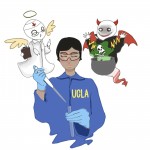New professions in the hard sciences are developing every day. Modern technologies and research methods create both excitement and controversy – stem cell research, animal testing and human genetic
engineering are only some of the contentious topics students may have to face upon entering the job market.
Students enrolled in science and technology programs at UCLA will become the world’s future doctors, researchers and innovators. But without proper training, they may not be prepared to address the range of ethical dilemmas that will surely come up at the cutting edge of science.
Currently, most hard science majors at UCLA such as biology, chemistry and neuroscience do not incorporate ethics courses into their core curriculum. Rather, they focus primarily on their core subject matter – hard science.
To fill that gap, two UCLA students recently began to push for a biomedical ethics minor. Although the plan is in its early stages, UCLA administrators should take note.
Jessica Kriksciun, a fourth-year psychobiology student, and Becky Barber, a fourth-year neuroscience student, felt the need for the minor after taking Molecular, Cell and Development Biology 60, one of the larger science-related ethics classes at UCLA. The class exposed students to the multitude of ethical dilemmas throughout scientific history. For example, Barber said she noted how homosexuality used to be considered a disease among medical associations nationwide.
Kriksciun and Barber are currently gauging student interest for the minor and conducting their own independent ethics research through their coursework.
Creating this minor, or at the very least incorporating ethics courses into science and research-based majors, should be a priority in such an advanced scientific and research institution as UCLA. While the university has a comprehensive Health Ethics Center for its Health System, no such established resource exists for undergraduates.
Pre-med students tend to focus on the pure science in their preparatory courses. While this concentration is obviously necessary, they lack the training to tackle difficult ethical decisions that will surely arise in their futures, Kriksciun said.
Indeed, fields such as medicine are riddled with much more than hard science. In the past couple of years, UCLA alone has been subject to a number of ethical questions, from animal testing to conflicts of interests in research.
UCLA science students will not be fully prepared for almost any science-related career if they do not learn how to critically approach such dilemmas.
Howard Winet, an orthopedic surgery and bioengineering professor, said his ethics class, Bioengineering 165, is one of the only subjective upper division classes many of his students have taken.
Some students are uncomfortable with the subjective nature of the class, he said.
Ethics courses therefore also benefit students, like engineers, who fall outside of the research sciences.
For example, if an engineer is particularly concerned about the conservation of water, he or she must understand the social underpinnings of that issue, Winet said.
UCLA already offers a few programs, such as the human biology and society major and the society and genetics minor, which merge societal and scientific approaches with today’s issues. But those fields of study are focused on specific branches of science. A biomedical ethics minor would supplement these programs and appeal to an even broader base of students, such as bioengineers and students interested in topics other than human biology.
UCLA prides itself on being a forward-looking and global institution. So it should ensure its future doctors, researchers and innovators are not only intelligent and capable, but prepared to face ethical questions with moral reasoning and nuance.
E-mail Ferdman at mferdman@media.ucla.edu or tweet her @MaiaFerdman. Send general comments to opinion@media.ucla.edu or tweet us @DBOpinion.

Actually, engineering students are required to take Engineering Ethics 183EW or Engineering Ethics 185EW to satisfy their writing II requirements. When I took the class, we looked at engineering failures, philosophical theories related to duty and social responsibility, and understanding the social implications of engineering projects, among other things.
I completely agree that ethics education is important for many career fields. Hopefully UCLA balances the need for classes like this with the more useless, yet required classes for some majors.
Aspring CPAs now also have to take ethics. Seems to be a trending issues.